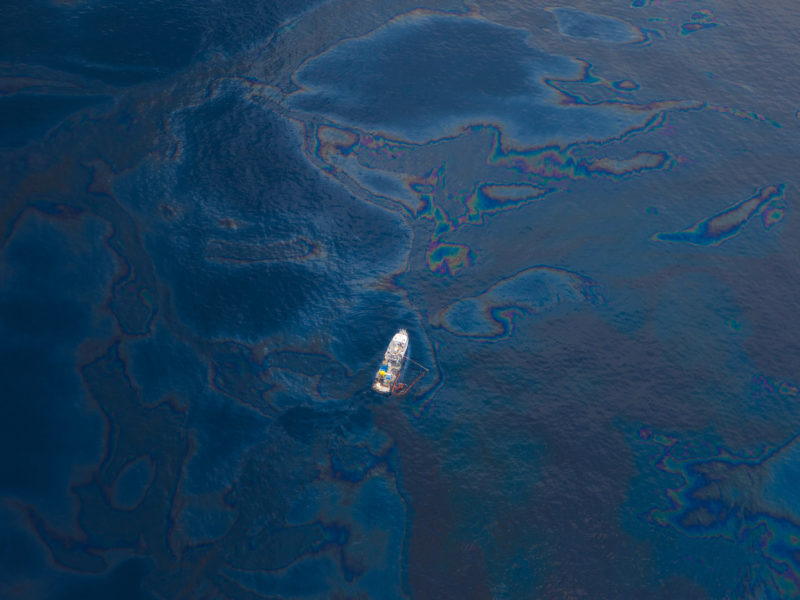Guest post by Jori Breslawski
Birds, sea turtles, and a young fin whale have all succumbed to a toxic tar infiltrating the Mediterranean, and experts fear these casualties are only the beginning of what has been called the worst ecological disaster in Israel’s history. What makes the animals’ deaths particularly worrisome is that they may be the result of a deliberate, politically motivated attack. If intentional, the episode will mark the beginning of a new era of terrorism that not only victimizes human beings but also wreaks havoc on the environment.
Israel has accused Iran of deliberately spilling oil into the Mediterranean in an act of “eco-terrorism.” While investigations are ongoing and questions remain surrounding the legitimacy of the claim, a leading international shipping journal based in London has also linked the spill to Iran. Regardless of whether the spill was intentional, the incident raises questions about the particular dangers presented by environmental terrorism, and whether we can expect environmental terrorism to constitute a major threat in coming years.
Environmental terrorism is a relatively new brand of terror that weaponizes the environment to accomplish political goals, putting water, agriculture, wildlife, and entire ecosystems at risk. If Iran is behind the oil spill in the Mediterranean, it would not be the first instance of environmental terrorism, but it would be one of the most prominent. The incident also comes at a time when the world has reached a climate emergency, with countries more vulnerable than ever to attacks on the environment.
Terrorists are likely to exploit this opportunity, as perpetrators can inflict greater economic and physical hardship by attacking resources that are already scarce or in danger. Indeed, researchers show that environmental terrorism is on the rise, with a recent study finding a 268 percent increase in water-related terrorism over the past five decades.
But should politically motivated attacks on the environment be defined as terrorism? Historically, scholars have classified events as terrorist attacks when they meet three criteria: (1) the attack is carried out in pursuit of a political goal, (2) it is meant to influence an audience, and (3) the perpetrators use violence or a threat of violence. Politically motivated attacks on the environment meet the first two criteria, but in most cases, not the third. As a result, some argue that acts like these do not constitute terrorism.
But the world is changing, and the increasing ability of both states and non-state actors to weaponize our fragile environment calls into question whether the current definition of terrorism needs to be broadened. Despite the absence of violence in most cases, these attacks are meant to hurt people economically, psychologically, and even physically.
In fact, environmental terrorism may be even more dangerous than conventional methods, since damage is more likely to be long-lasting and widespread. Worse, governments are not prepared to confront environmental terrorism due to its transnational nature and their persistent failure to prioritize the environment.
Environmental terrorism is likely to have a greater reach than conventional forms of terrorism. Terrorism, by design, is meant to have a psychological impact on a much wider audience than those physically targeted by the attack. However, the physical effects of attacks on water sources, agriculture, or ecosystems—be that thirst, hunger, or loss of livelihood—have the potential to shape the lives of exponentially larger audiences than attacks on buses or buildings.
The effects of environmental terrorism are also likely to be longer-lasting than conventional forms of terrorism—and in some cases, irreparable. This is especially true in the increasing number of contexts in which resources are scarce or ecosystems are fragile, where environmental terrorism can be catastrophic.
Environmental terrorism may also be particularly challenging to address for a couple of reasons. First, the transnational nature of environmental terrorism makes it difficult to hold perpetrators accountable. Many parts of our environment—water, air, and wildlife—are not encapsulated within the borders of a single country, making it possible to carry out attacks from outside a country’s borders.
Second, governments are not prepared to confront environmental terrorism, so the consequences of these attacks will be particularly difficult to cope with. For instance, in the wake of the recent oil spill, environmental advocacy groups have criticized the Israeli government for its failure to set aside funding and establish the infrastructure to address environmental emergencies. More broadly, governments have failed to think of the environment as a security issue, due to their preoccupation with maintaining political, economic, and social stability.
The prevention of environmental terrorism requires governments to take action if they hope to meet the challenges of the changing nature of politically motivated attacks. Governments need to understand the nature of the threat, create mechanisms of cooperation across transnational boundaries, and construct infrastructure that prepares countries for effective and rapid responses. Without a drastic change in mindset, governments will be left unprepared to confront evolving threats, and our environment will pay the price.
Jori Breslawski is a Postdoctoral Fellow at the Watson Institute for International & Public Affairs at Brown University.







